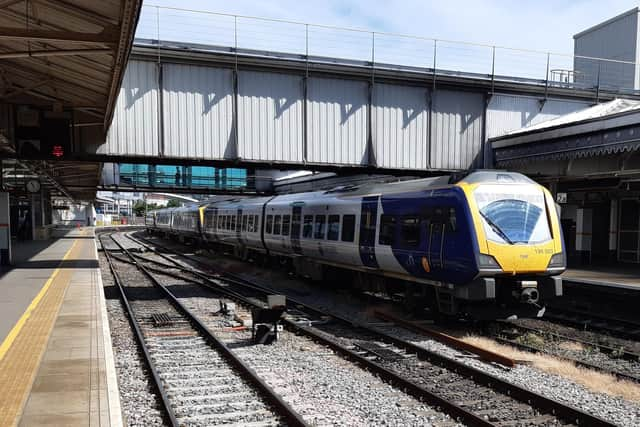Sheffield trains: What services will be running during heatwave as Northern issues 'do not travel' warning
and live on Freeview channel 276
Northern has advised passengers not to travel on Tuesday, July 19 and only do so on Monday, July 19 if essential.
Other rail operators in the region have also advised people only if absolutely necessary on the two days, with an amber weather warning in place for Sheffield, where the temperature is forecast to hit a record 38C, and a red ‘danger to life’ alert in other parts of the country.


Advertisement
Hide AdAdvertisement
Hide AdAs well as Northern, East Midlands Railway, TransPennine Express and LNER have all warned of major disruption, including delays and cancellations, with the extreme heat likely to cause tracks to buckle and overhead power lines to sag.
Here is the latest advice they have issued to passengers.
Northern
Northern says passengers should only travel if essential on Monday, when an amended timetable will be in place and delays and cancellations are expected.
On Tuesday, its advice is ‘do not travel’.
Sheffield weather: Schools closing, shutting early and cancelling trips due to extreme heat
It says: “You should only attempt to travel if absolutely essential and check regularly before travelling. Some routes will be closed completely, especially on Tuesday in the North East, Yorkshire and Humber. and you should not attempt to travel as there will be no alternative options.
“Online journey planners will be updated as soon as possible but some changes may not show until the day of travel so we advise to keep checking back.”
East Midlands Railway
Advertisement
Hide AdAdvertisement
Hide AdEast Midlands Railway says it will be running a reduced timetable on both days and passengers should only travel if necessary. It says it is unable to provide alternative transport for the services that are cancelled or altered.
It says the extreme heat can cause the track to buckle and bend, which poses a serious safety risk to its Intercity trains which travel at between 100 and 125 miles per hour.
As a result, a lower speed limit will be in place on the Midland Main Line on Monday and Tuesday. There will be fewer services and journeys will take significantly longer.
There will be one London train an hour to and from Sheffield, rather than two.
Advertisement
Hide AdAdvertisement
Hide AdIts Doncaster / Lincoln / Peterborough services will be cancelled and there will be disruption on other routes.
TransPennine Express
TransPennine Express says it will be running an amended timetable on both days, with customers advised to travel only if absolutely necessary.Its Hull-Manchester, Redcar Central-Manchester and Huddersfield-Leeds (local stopper) services will not run on either day.
On other services, there will also be speed restrictions in place, meaning journeys will take longer, and delays and cancellations are likely. Customers are also advised to be prepared for the hot weather by bringing water and sunscreen with them, as well as checking their journey very carefully before travelling.
LNER
LNER says passengers should only travel if necessary on Monday. On Tuesday, it says people should not attempt to travel between London King's Cross and south of York and Leeds, because no trains will be running. It said this includes Wakefield Westgate, Doncaster, Retford, Lincoln, Newark Northgate, Grantham, Peterborough, and Stevenage.
Why does extreme heat cause such disruption on Britain’s railways?
Advertisement
Hide AdAdvertisement
Hide AdNetwork Rail, which is responsible for maintaining the tracks, says hot weather can be as ‘challenging’ as freezing winters.
Steel tracks absorb heat easily, it says, and can get up to 20 degrees hotter than the air temperature, causing them to expand, push up against the rails next to them and buckle.
Measures taken to minimise the impact include painting the tracks white to reduce the heat absorbed, but speed restrictions are put in place when the air temperature is forecast to exceed 36C.
Hot weather also causes the overhead lines providing power to trains to expand and sag
Advertisement
Hide AdAdvertisement
Hide AdIf the overhead lines are damaged, train services have to be cancelled or delayed until they are fixed. Modern overhead lines are designed to withstand hot weather much better than older ones, which are gradually being replaced.
For the latest travel information, visit: www.nationalrail.co.uk.
